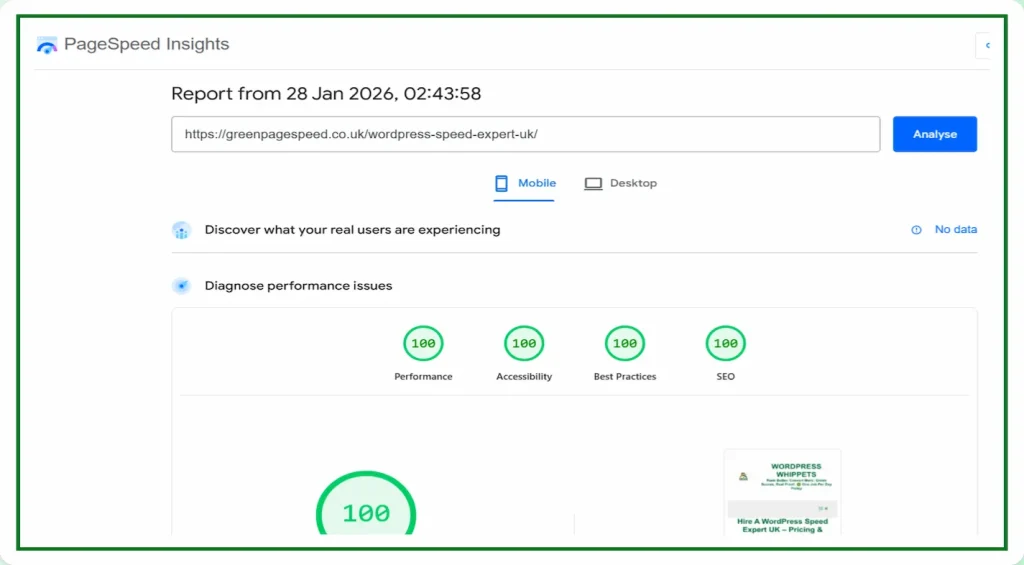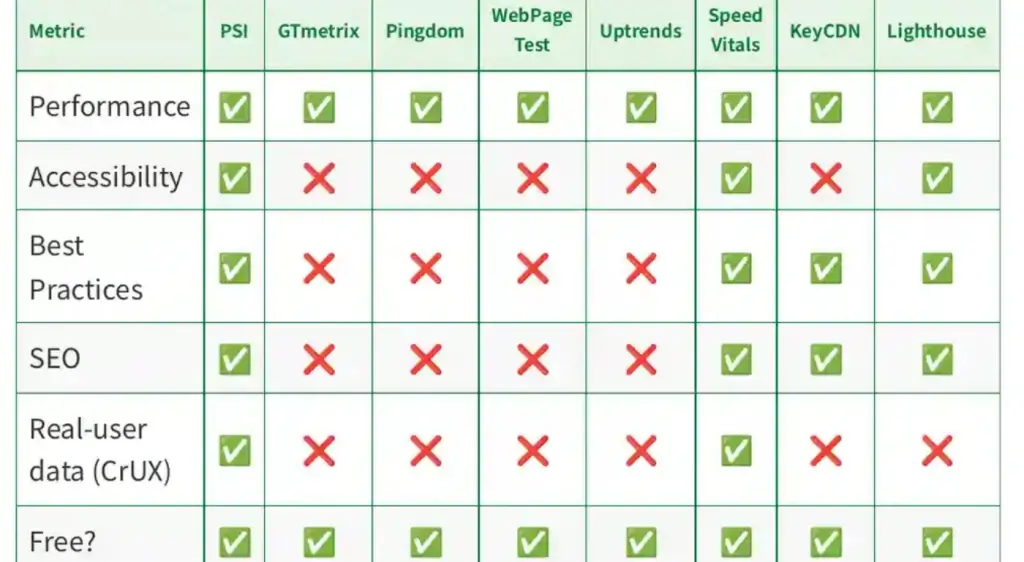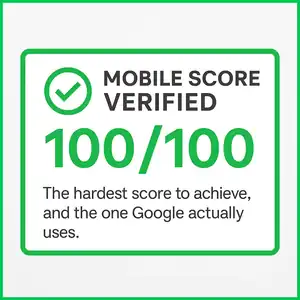Discover what site speed is, why it matters for SEO and customers,
Learn how to enhance performance with simple 2026 fixes.
See our PageSpeed test results and scroll down.
Updated 28 January 2026
Run a Google PageSpeed Test for Your Website (Free Tool Below)
⚠️MOST WEBSITES SCORE UNDER 50
HOW ABOUT YOURS?
✅ Independently verified by Google PageSpeed
Try a FREE website speed check below
🔗 TEST YOUR SITE SPEED NOW
**PSI is a testing tool, not an endorsement.**
A genuine endorsement of our performance work
You can read the official WPX appraisal below.
WPX APPRAISAL
One Job P/Day =FULL FOCUS
We Give Our Full Focus To The One Website
PER DAY
We only take on one website per day, because rushing speed work doesn’t cut it.
Your site gets our full focus, and every detail is tuned for performance.
This hands-on approach consistently changes your PSI scores to green. It boosts Google rankings.
You will attract more traffic, more visibility, and ultimately, more business.
However, the good news is that once you know how to use Google PageSpeed Insights properly,
You’ll uncover exactly what’s dragging your site down and how to fix it for good.
Afterwards, look at the homepage and check out the full service that delivers these kinds of results shown on the “Live Results” page. (Updated Daily)
You pay upfront, and we do the work fast.
There are no hidden costs.
✅ Mobile-first
✅ Core Web Vitals fixed
✅ Google Green scores achieved
✅ Before & after proof
✅ 100% UK-based, WordPress-only service
Because site speed is one of the key factors in how people experience your website.
A slow site drives visitors away before they see what you offer.
Search engines also use site speed as a ranking signal, so every second counts.
Faster site speed keeps customers on your pages longer, improves conversion rates, and builds trust.
With the right fixes, any WordPress site can hit green scores and stay fast.
Go to this PageSpeed Insights link to read about how you can measure your site speed.
Slow load times are quietly killing your site’s potential.
“Can you guarantee I’ll get green PageSpeed Insights scores?”
Without a doubt, we guarantee a significant speed boost.
Most clients achieve scores of 90–100 on Google PageSpeed Insights.
If we fail to deliver green results across the core metrics, you’ll receive a full refund.
Our daily proof results reinforce these real scores.
In this guide, we’ll break down exactly why site speed matters more than ever and how you can fix it fast
By the end of this page, you’ll know:
✅ What site speed means and how Google measures it
Why faster sites outrank slower ones (with real PageSpeed Insight metrics)
✅ How poor performance directly affects your bounce rate, conversions, and SEO
The most common causes of slow WordPress websites
✅ The 7 exact steps we use to regularly get green scores (90+) on Google PageSpeed Insights
And why improving your site speed could be the easiest SEO win you make this year
We’ve included visual proof of perfect scores, step-by-step improvements you can make,
And a no-obligation offer to get your site analysed completely free.
Ready to stop losing traffic to a slow site? Let’s get started.
In this guide, we’ll break down why site speed matters, how it affects your SEO,
Additionally, there are steps you can take to have your site load quickly.
Trusted by UK businesses for WordPress speed optimisation UK-wide.
What Is Site Speed?
Site speed refers to the speed at which a website loads and becomes interactive for the user. It’s measured by various metrics such as:
First Contentful Paint (FCP)
Largest Contentful Paint (LCP)
Time to Interactive (TTI)
Total Blocking Time (TBT)
Cumulative Layout Shift (CLS)
These metrics are commonly assessed using tools like Google PageSpeed Insights and even GTMetrix
Real results just below 👇”
While anyone can type any domain into PageSpeed Insights.
The preview on the right shows the actual website tested.
Every example on this site is ours.

We host Green Page Speed on WPX — fast, secure, and independently tested in all our PageSpeed proofs.
Try WPX Hosting (affiliate link)
🟢 Want help understanding your score?
We’re offering free manual WordPress speed reviews to the next 10 site owners.
✅ Real PageSpeed Insight breakdown
✅ Clear, plain-English advice
✅ No tools, no selling, only help
Drop us a message via the contact form, and we’ll reply to the next 10 people.
Or if you’d prefer to go DIY, you can run your test below and try to make sense of it 😉
Why Site Speed Matters for SEO
1. Google Uses Speed as a Ranking Factor
Google has confirmed that site speed is a ranking factor in its search algorithm.
Fast-loading websites get a boost in search engine results pages (SERPs), especially on mobile devices.
With mobile-first indexing now standard, your mobile speed performance is more important than ever.
So, if you’re looking to improve yours, feel free to CONTACT US for a no-obligation free site speed check.
We will inform you of what issues you are facing.
2. Better User Experience
Slow websites frustrate users. According to Google, the probability of a bounce increases by 32% as page load time increases from 1 to 3 seconds.
When users leave quickly, they send negative signals to search engines, like –
High bounce rate
Low average session duration
Few pages per session
These signals can negatively impact your SEO and diminish your chances of ranking well.
3. Improved Conversion Rates
Speed is not just about SEO; it’s also about sales and leads. Studies show that faster websites convert significantly better. Every second delay can reduce conversions by up to 7%. If your site is an e-commerce store, slow speed directly affects your revenue.
4. Enhances Crawl Budget Efficiency
Googlebot has a limited crawl budget for every site.
If your site loads slowly, fewer pages may be crawled and indexed, which can delay the appearance of new content in search results.
Fast-loading pages allow Google to crawl more pages in less time.
📬 Claim Your Free WordPress Speed Check
Common Causes of Slow Site Speed
If your site is running slow, it could be due to one or more of the following issues:
Unoptimised images
Excessive or render-blocking JavaScript
Poor web hosting
No caching strategy
Bloated themes or plugins
Lack of a content delivery network (CDN)
External resources loading slowly (fonts, embeds, ads)
Addressing these issues is key to improving both SEO and user experience.
How to Improve Your Site Speed
Improving site speed doesn’t have to be overwhelming.
Here are some quick wins and professional recommendations:
1. Use a Lightweight Theme
Choose a clean, performance-focused theme that doesn’t rely on excessive scripts.
Avoid bloated page builders unless necessary.
📬 Claim Your Free WordPress Speed Check
2. Optimise Images
Compress images and serve them in modern formats such as WebP.
Also, make sure they are sized appropriately for their containers.
3. Minify CSS, JavaScript, and HTML
Remove unnecessary characters and whitespace from code to reduce file size and improve loading times.
4. Enable Browser Caching
Use server settings or a caching plugin to store frequently used resources in users’ browsers.
5. Implement a CDN – A Must For Good Site Speed
A content delivery network distributes your content across multiple servers worldwide, ensuring faster delivery to users based on their location.
6. Eliminate Render-Blocking Resources
Use Async or Defer for all non-essential JavaScript, and prioritise critical CSS so that content loads quickly above the fold.

7. Choose a Reliable Hosting Provider
Your hosting plays a role in how quickly your website loads, so choose a hosting provider with fast servers and support for technologies like LiteSpeed or NGINX.
Why Site Speed Is More Important Than Ever in 2026
With AI-driven search algorithms, voice search, and mobile browsing dominating digital behaviour, users demand instant results.
Google’s focus on user-centric performance metrics (like Core Web Vitals) makes speed one of the most important SEO elements you can control.
If your competitors are faster, you risk losing traffic, rankings, and revenue. Speed is no longer optional; it’s expected.
Why You Must Have Site Speed
Site speed is a foundational element of technical SEO and a major contributor to overall website success.
Whether you’re aiming to improve rankings, boost conversions, or enhance user experience, speed should be one of your top priorities.
Investing in performance today means higher visibility, better engagement, and more sales tomorrow. If you’re serious about SEO, site speed isn’t just important; it’s essential.
Slow sites kill sales.
Let’s check yours before it costs you more.
FILL IN OUR FORM TO GET A FREE, NO-OBLIGATION SPEED CHECK
⚠️ Please don’t pay until we’ve confirmed your site qualifies. Contact us first. ⚠️
We’ll respond quickly and let you know the next steps

